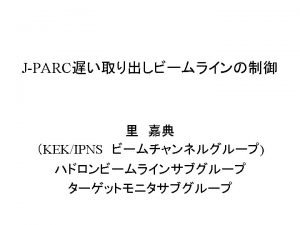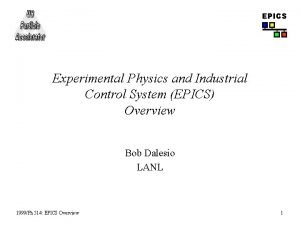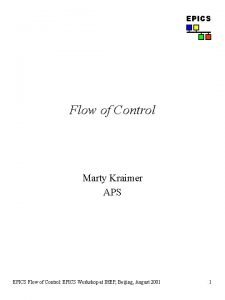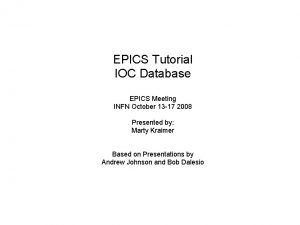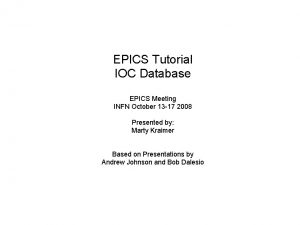IMPORTANCE OF AGRICULTURE AGRICULTURE l IMPORTANCE IN EPICS



















- Slides: 19

IMPORTANCE OF AGRICULTURE

AGRICULTURE l. IMPORTANCE IN EPICS l. INCREASE IN GRAIN PRODUCTION FROM 50 MILL TONS TO 200 MILLTONS l. VARIATION IN AGRI GROWTH IN DIFFERENT PARTS OF COUNTRY l. TARGET GROWTH RATE OF 4%

Its’ importance……. PROVIDES RAW MATERIAL FOR MANUFACTURING INDUSTRY. l IMPORTANCE IN CULTURES, TRADITIONS AND CUSTOMS. l PROVIDES LIVELIHOOD TO 70% OF LABOR FORCE. l IMPORTANCE IN INTERNATIONAL TRADE. l

FOREIGN TRADE (In US $ billion) 2000 -01 2001 -02 2002 -03 EXPORT 44. 1 43. 8 51. 7 IMPORT 50. 0 50. 7 59. 4 BALANCE -5. 90 -6. 9 -7. 7

DATAS (in crores) 1970 -71 1980 -81 1990 -91 1995 -96 1998 -99 GDP 39708 122427 477814 1006286 1612383 GDP IN AGRI 16821 42466 135162 255613 428680 TOTAL EXPORT S 1535 6711 32558 106353 141604 AGRI EXPORT S 487 2057 6019 20344 25225

INDIA ATTAINED SELF-SUFFICIENCY IN FOOD GRAIN PRODUCTION IN 1998. l FOOD PRODUCTION IN 2003 -04 IS 210. 8 MILLION TONS. l GROWTH RATE WAS HIGHER IN 199697…. . i. e, 9. 6% l AGRICULTURE GROWTH HAS GOT MULTIPLIER EFFECT IN ECONOMY. l

INDIA HAS GOT 130 MILL HA OF CULTIVABLE LAND l 12. 9% OF POPULATION OWNS 65% OF THE CULTIVATED AREA. l AGRICULTURE IS THE MAJOR SOURCE OF INCOME FOR TWOTHIRDS OF THE POPULATION l 3% GROWTH IN AGRI LEAD TO 2. 6% GROWTH OF INDUSTRY. l

NET CAPITA AVAILABILITY OF FOOD GRAINS NET AVAILABILITY OF FOOD GRAINS= GROSS PRODUCTION-SEED-FEEDWASTAGE-EXPORTS+IMPORTS-----(1) (1)/POPULATION ESTIMATES FOR A YR l 1951 – 394. 9 gm 2002 – 491. 2 gm

Geographic area= 328. 73 m ha Net area sown = 141. 23 Total cropped area = 189. 74 Area sown more than once = 48. 51 m ha Cropping intensity = 134. 3 m ha Gross irrigated area = 76. 34 mha Net irrigated area = 57. 24 mha

PRODUCTION OF CROPS (2002 -03) RICE- 75. 72 MILLION TONNES ----W. BENGAL IS THE MAJOR PRODUCER— 16. 39% l WHEAT-69. 32 MILLION TONES ---- U. P IS THE MAJOR PRODUCER— 34. 84% l FOOD GRAIN PRODUCTION = 182. 57 MILL TONNES

Minimum support prices Paddy = 5. 50/- per Kg l Maize = 5. 05/- Per kg l Cotton = 13. 60 /- per bale l

POPULATION OF AGRICULTURAL WORKERS YR 1951 2001 TOTAL AGRICULTIVAT POPULATI URE ORS ON(million) LABOURE (million) RS 361. 1 27. 3 69. 9 (19. 5%) (49. 9%) 1027 107. 5 (million) 127. 6

SHARE OF PUBLIC SECTOR OUTLAY & EXPENDITURE PLAN OUTLAY (CRORES) % SHARE TO TOTAL OUTLAY NINTH PLAN 42, 462 4. 9% TENTH PLAN 20, 668 5. 2%

DARKER SIDE OF AGRICULTURE CAPITAL INADEQUACY l LACK OF INFRASTRUCTURE l CONSTRAINTS IN DEMAND SIDE l INSUFFICIENCY IN INPUT SUBSIDIES IN AGRI EXPENDITURE. l

Problems in Indian Agriculture 1. Inherent Problem of irrigation: l 63% of arable land is rainfed. l Only 35 % of production come from that. 2. Fragmented land holdings: l Average size of land holdings declining. l 59% of operational land is marginal holdings i. e. less than 1 hectare.

3. Indiscriminate use of HYVs and declining productivity. l. Use of more inputs like fertilizers and pesticides. l. Reduction in soil fertility. l. Crop failures and suicides. 4. Structural problems. l. Limited liberalization in Agriculture. l. Dangerous shift towards cash crops. l. Need for sustainable growth.

Problems continued……. . 5. Lack of proper agricultural policies: l Reform in agriculture sector. l Open trade policies. l Weak agricultural research base. 6. Lack of Integrated approach towards Wasteland development l 175 mha of land under some degradation. l Overgrazing and overexploitation of land. l Long term investment required.

Suggestions: l l l l Proper post harvest technologies. Training centers for farmers. National centre for crop forecasting Integrated crop insurance schemes. Regeneration of wastelands at community level. Increase in plan allocation of Agriculture. Bring more area under irrigation through five year plans.

l. THANK YOU
 Epics calc record
Epics calc record Epics calc
Epics calc Epics channel access
Epics channel access Css epics
Css epics The earliest known grecian epics were written by____ .
The earliest known grecian epics were written by____ . Epics ioc
Epics ioc Epics calc record
Epics calc record Epics sequencer
Epics sequencer Epics 7
Epics 7 Epics database
Epics database Definition of ready for epics
Definition of ready for epics Epics tutorial
Epics tutorial Epics control system
Epics control system Epics caget
Epics caget Types of epic poem
Types of epic poem Most famous epics
Most famous epics Best epic in the world
Best epic in the world Epics channel access
Epics channel access Why do epic heroes have supernatural powers
Why do epic heroes have supernatural powers Python epics
Python epics


